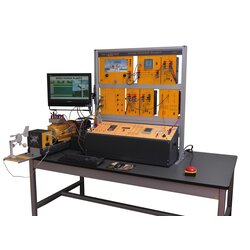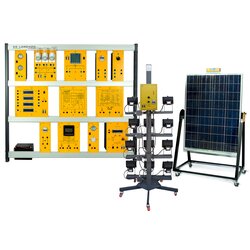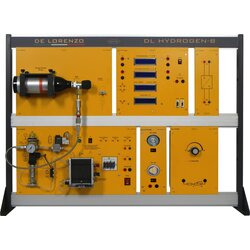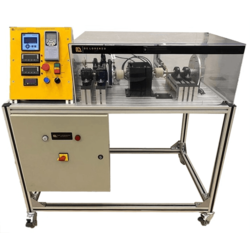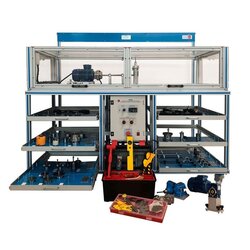Green Skills Training Lab in Northern Scotland
In the face of escalating environmental concerns and the urgent need to transition to sustainable energy sources, the demand for "green skills" has never been more critical. As the world pivots towards renewable energy solutions, the need for a workforce trained in these new technologies is paramount.
Recognizing this imperative, North East Scotland College has taken bold steps to integrate cutting-edge renewable energy training equipment into its curriculum. This initiative not only prepares students for the evolving job market but also contributes to Scotland's broader green economy goals.
In this project Edquip worked with two technolgy companies from Italy and Spain. You can see the products implemented in this project at the bottom of this project description, or browse Renewable Energy Lab Equipment to find a wider range of solutions.
Challenge
Addressing the Skills Gap in Renewable Energy
Scotland, with its abundant natural resources and commitment to environmental stewardship, is at the forefront of the renewable energy revolution. However, the region faces a significant challenge: a gap between the rapid growth of the renewable energy sector and the availability of a skilled workforce. Colleges and training institutions are tasked with bridging this gap, yet many lack the infrastructure and resources to provide hands-on, industry-relevant training in emerging green technologies.
The challenge is not just about education; it's about ensuring that students are equipped with practical skills that are directly applicable to the workplace. The absence of such training programs could slow down the adoption of renewable technologies and hinder the region’s progress toward its sustainability goals.
Solution
Innovative Training Solutions for Future Professionals
To address this challenge, the college implemented six state-of-the-art training equipment systems specifically designed for teaching renewable energy technologies. The equipment covers a broad spectrum of green skills, including wind energy, solar power, hydrogen fuel cells, and mechanical drive systems.
- Wind Energy: Students learn the intricacies of wind turbine technology, from the basic principles of aerodynamics to the mechanics of power generation and maintenance.
- Solar Power: With hands-on training in photovoltaic systems, students gain expertise in solar panel installation, maintenance, and energy efficiency optimization.
- Hydrogen Fuel Cells: This emerging technology offers students a unique opportunity to explore sustainable energy storage and production, key components in the future of green energy.
- Mechanical Drive Systems: Understanding the mechanical aspects of renewable energy systems is crucial for ensuring their efficiency and longevity.
These comprehensive training modules are designed to mimic real-world conditions, giving students invaluable practical experience. By embedding these technologies within the curriculum, the college ensures that graduates are not just theoretically proficient but also practically prepared to meet industry demands.
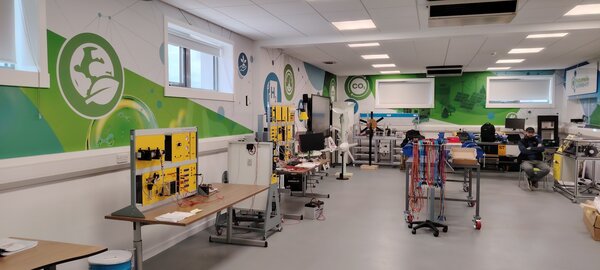
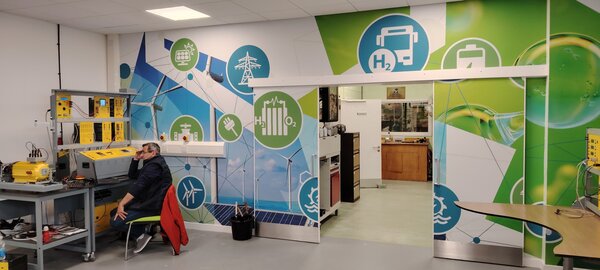
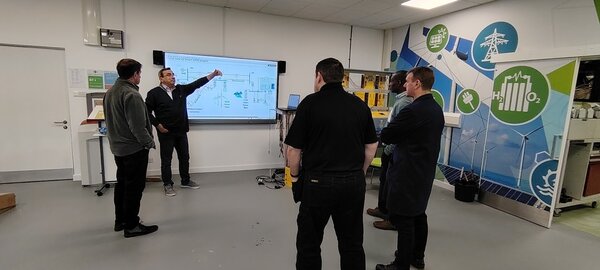
Results
Empowering Students and Advancing Sustainability
The introduction of this advanced training equipment has already begun to yield impressive results. Students are being placed as wind turbine technicians, solar panel installers etc. Those students who have engaged with the new modules report a significant increase in their confidence and competence in renewable energy technologies. The hands-on experience has translated into a deeper understanding of the challenges and opportunities within the green energy sector.
The college has also seen an increased interest from prospective students. Employers in the region have also taken note, getting involved with supporting the program and having a strong preference for graduates from this program due to their practical experience and readiness to contribute to renewable energy projects from day one.
The ripple effects of this initiative extend beyond the college. By producing a skilled workforce equipped with the latest green skills, the college is directly contributing to the region's sustainable development goals. Graduates are not only filling existing job vacancies in the renewable energy sector but are also positioned to drive innovation and further advancements in the field.
Conclusion
As the global transition to sustainable energy continues to accelerate, the need for green skills is more urgent than ever. The North East Scotland College is setting a benchmark by integrating state-of-the-art renewable energy training equipment into its curriculum, ensuring that its students are at the forefront of this transformation.
Through this initiative, the college is not only addressing the current skills gap but is also preparing its students to lead the charge in the renewable energy sector, ultimately contributing to a greener, more sustainable future.

Producer quote




